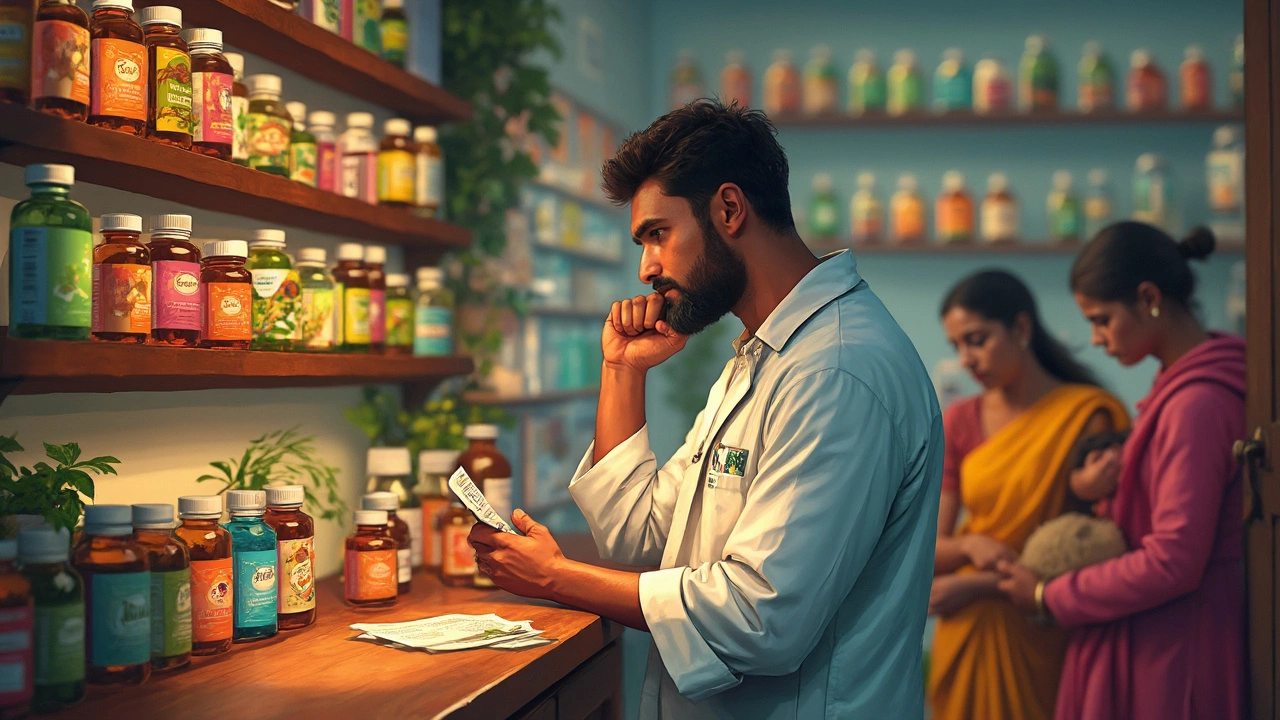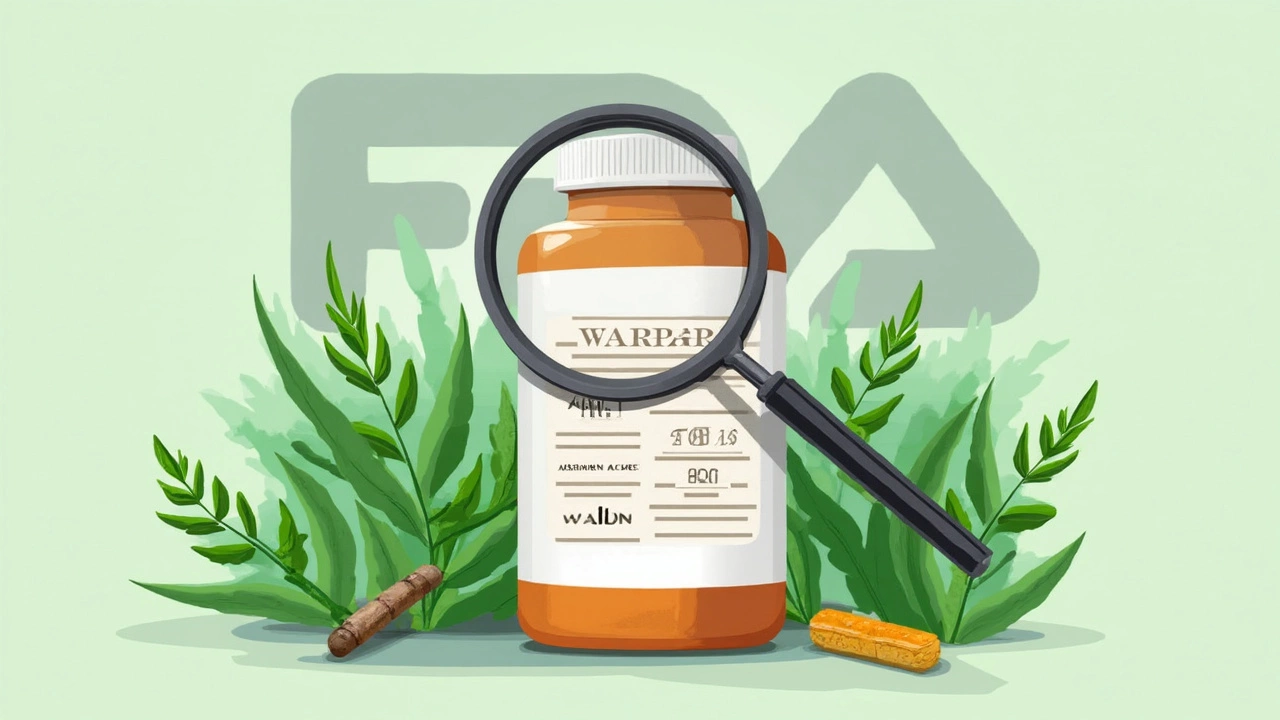
Most people think the FDA has to approve herbal supplements before they land on store shelves. Actually, that’s not how it works. The FDA doesn’t review or approve these products before they’re sold. Companies can put new supplements on the market without showing any proof that they’re safe or that they work.
So, if you’ve ever wondered who checks if a new herbal supplement is safe, the honest answer is: it’s just not like that. Unless a product causes harm and gets reported, it usually stays on the shelves no matter what’s inside. That puts the pressure on you—the customer—to dig a little deeper before popping those pills or blending that herbal powder into your smoothie.
People often assume what they buy is checked for quality and safety because the label looks official. It’s natural to think something sold in stores must be okay, right? But with supplements, you need to look past the packaging. Knowing how the FDA actually works with these products helps you make safer and smarter choices.
- What Does FDA Approval Mean?
- How Herbal Supplements Are Regulated
- Common Misconceptions About Supplement Safety
- Hidden Risks: Contamination and Quality Issues
- How to Choose Safer Herbal Supplements
- What to Watch Out for When Buying
What Does FDA Approval Mean?
When you hear that something is "FDA approved," it basically means the U.S. Food and Drug Administration checked it out for safety, effectiveness, and quality before it goes to market. This process is super strict when it comes to prescription drugs and some medical devices. Companies run years of studies and submit data showing a drug does what it's supposed to do, is safe, and meets quality standards.
For regular prescription drugs, the FDA looks at the results from lab tests, animal studies, and several phases of clinical trials on people. Only if everything looks solid, and the benefits outweigh any risks, will the FDA give the green light. In fact, getting FDA approval for a new drug often takes up to 10 years and costs millions—or even billions—of dollars.
Check out how the FDA process compares for drugs versus supplements:
| Product Type | FDA Approval Needed? | Pre-market Testing? | Label Review? |
|---|---|---|---|
| Prescription Drugs | Yes | Extensive (years of trials) | Yes |
| Herbal Supplements | No | No required testing | Yes, but only for illegal claims |
But here's the twist: herbal supplements don’t go through that long approval process. Companies don’t have to show the FDA proof of safety or effectiveness before selling their products. The FDA does require that they don’t make false medical claims on labels, but even there, enforcement is hit or miss unless someone complains or a product is proven dangerous.
How Herbal Supplements Are Regulated
The way herbal supplements are handled in the U.S. is way more relaxed than you might guess. The FDA actually regulates supplements as a category of food, not drugs. That’s a really big deal. What this means is herbal supplement makers don’t need FDA approval before they sell their products. That’s the opposite of prescription drugs, which face a mountain of tests and paperwork before they’re allowed for sale.
Under a law called the Dietary Supplement Health and Education Act (DSHEA) passed in 1994, supplement companies are responsible for making sure what they sell is safe and labeled accurately. The FDA just steps in if there’s a genuine problem—say, someone gets sick or the product is contaminated. But the FDA doesn’t test, inspect, or pre-approve products before they hit the market.
Here’s how the process actually works:
- Companies make and sell herbal supplements without needing approval from the FDA.
- It’s up to companies to be honest about what’s in their products and make sure they’re safe.
- If a supplement claims to treat or cure a disease (like saying it ‘cures diabetes’), the FDA can step in, since that’s not allowed.
- Once a product is being sold, the FDA can pull it from stores—but only if they have solid proof it’s unsafe or misleading.
Surprised? You’re not alone. Here’s a snapshot to help you compare how things stack up:
| Product Type | FDA Approval Needed? | Testing Before Sale? |
|---|---|---|
| Prescription Drugs | Yes | Extensive clinical trials |
| Herbal Supplements | No | No required testing |
| Vitamins/Other Supplements | No | No required testing |
So, if you see a supplement on the shelf, it’s basically being sold on an honor system. The FDA mainly acts after problems are reported. That’s why it matters to do a little homework before trusting a new bottle of herbal supplements or any pills promising amazing results.
Common Misconceptions About Supplement Safety
If you think herbal supplements are always safe because they’re “natural,” you’re not alone. This is probably the top myth in the world of herbal supplements. Plenty of people assume these products can’t hurt you, like they’re just fancy food. But natural doesn’t mean risk-free. Some plants can cause serious side effects, especially if mixed with medications or taken in high doses. For example, kava and comfrey have both been linked to liver damage.
Another big misunderstanding is that because supplements are for sale everywhere, the FDA must have checked them. In reality, sellers don’t have to prove safety or effectiveness to the FDA before putting their products on the market. That official-looking label with all the promises? It doesn’t mean the FDA reviewed or approved it.
Ever heard that dietary supplements must all meet the same standards as medications? Not true. Prescription drugs have to go through years of testing before they’re approved, but herbal supplements don’t. Instead, the FDA usually steps in only after there have been reports of big problems—think hospital visits or dangerous side effects. There’s simply less oversight before something goes wrong.
Here’s another one: some folks believe that more is better. You see supplements in mega doses and think you’ll get bigger benefits. In reality, large amounts can bring real risks, especially with things like vitamin A or iron, where too much becomes toxic.
Let’s look at some real numbers to put things in perspective:
| Myth | Reality |
|---|---|
| Supplements are tested and approved by the FDA | No pre-approval; FDA can only act after problems happen |
| Natural means safe | Some ingredients cause liver, heart, or kidney problems |
| Supplements can’t interact with medications | Some supplements make meds less effective or raise risks |
So, before you trust that next shiny bottle, remember these facts about supplement safety. It pays to stay skeptical and do a little research, even for things that sound natural or harmless.

Hidden Risks: Contamination and Quality Issues
Just because a bottle says it’s a natural herbal supplement doesn’t mean what’s inside is clean or even exactly what’s listed on the label. One big problem is contamination—foreign stuff that’s not supposed to be there. Think pesticides, heavy metals like lead and arsenic, or even chunks of other plants. In fact, a 2015 New York State investigation found that nearly 80% of certain popular brands sold at big-box stores didn’t contain the herbs they claimed on the label.
It gets worse when you realize that sometimes, supplements have prescription drugs mixed in. The FDA has actually found hidden drugs or banned substances in hundreds of supplement brands, especially those promising ’miracle’ weight loss, sexual enhancement, or muscle building. Not a good look for your daily routine, right?
Then there’s quality. Manufacturing isn’t always tight. Some batches contain more—or less—of the active ingredient than the label says. Sometimes, there’s no active ingredient at all. This matters if you’re counting on a certain dose to help with sleep, anxiety, or anything else.
If you’re curious about where problems pop up the most, here’s some data the FDA has released over time:
| Type of Contaminant | Commonly Found In | Potential Risks |
|---|---|---|
| Pesticide residues | Traditional Chinese herbs, imported supplements | Toxicity, allergic reactions |
| Heavy metals (lead, arsenic) | Ayurvedic products, herbal powders | Kidney damage, developmental problems |
| Prescription drug additives | Weight loss, sexual health, bodybuilding supplements | Unexpected side effects, interactions |
| Incorrect or missing ingredients | All categories | No benefit, potential harm |
So, how do you dodge these hidden risks? Look for brands that use third-party testing—or check for seals from organizations like USP or NSF. Always be on guard for products with wild claims. If the price or promises sound too good to be true, they usually are.
How to Choose Safer Herbal Supplements
If you’re picking out herbal supplements, playing it safe is all about asking the right questions and checking a few key details. Since the FDA doesn't check these products beforehand, you have to be your own safety checker. Here’s how you can lower your risk and end up with something that actually works—and won’t harm you.
- Check for Third-Party Testing. Look for stamps like USP, NSF, or ConsumerLab on the label. These groups aren’t perfect, but they test for stuff like purity and the right amount of active ingredients. If you spot one, it’s usually a better pick than something with no stamp at all.
- Buy From Reputable Brands. Stick with brands you know or ones that have a solid reputation. If a company’s been in business for years and gets recommended by doctors or pharmacists, that’s a plus. Super cheap, unknown brands online can be sketchy.
- Check The Ingredients List. Don’t just skim past it. Some supplements add fillers, allergens, or extra stuff you don’t need. If you see tons of weird ingredients, or it’s all in a foreign language, skip it.
- Look at the Dosage. More isn’t always better. Too much of a so-called good thing can cause side effects, and some herbal blends mix in way higher doses than you really need.
- Read Real Reviews. Go beyond ads and influencer hype. Actual users will point out if something gave them a weird reaction, didn’t work, or had an off taste or smell.
One pretty shocking fact—according to a few recent quality checks, about 1 in 5 herbal supplements tested in the US didn’t actually contain what the label promised! Some even had zero of the claimed herb.
| What to Check | Why it Matters |
|---|---|
| Third-party seal (USP, NSF) | Shows independent testing for purity and strength |
| Reputable brand | Lower chance of hidden ingredients or fake claims |
| Clear dosage label | Helps avoid accidental overdosing |
If you’re not sure, check with your doctor or a pharmacist, especially if you already take medications. The wrong herbal supplements can mess with prescription drugs. When it comes to supplements, you can’t just trust the label. Do a bit of homework and you’ll dodge a whole lot of trouble.
What to Watch Out for When Buying
When you’re shopping for herbal supplements, don’t just grab the first bottle you see. Not all supplements are created equal, and the FDA isn’t approving what’s on those shelves. Here’s what you should check out before you buy—and some pitfalls that are easy to miss.
- Check for third-party testing. Reputable supplements are often verified by outside groups like NSF, USP, or ConsumerLab. These seals mean someone actually checked the contents for quality and what’s claimed on the label.
- Look at the ingredient list. Unpronounceable ingredients or mysterious “proprietary blends” are a red flag. If you can’t tell what’s in it, skip it.
- Be careful with big claims. If a label promises to cure, prevent, or treat diseases, that’s against FDA rules for herbal supplements. Legit products don’t make those claims. Watch out for words like “miracle cure,” “scientifically proven,” or “guaranteed results.”
- Check the expiration date. Old supplements can lose potency or even become unsafe. Always pick products with a clear, recent expiration date.
- Research the brand. Google the company. Have there been recalls or FDA warnings against them? If so, stay clear.
Here’s a quick example of what you might find when a supplement hasn’t been properly checked. In 2023, the FDA found that some ‘herbal weight loss’ supplements contained undeclared prescription drugs. That’s scary stuff—especially if you have health conditions or take other medications.
If you want a clearer picture, here’s what actually happens behind the scenes with supplement safety:
| Factor | Supplements | Prescription Drugs |
|---|---|---|
| FDA Pre-Approval | No | Yes |
| Mandatory Safety Testing | No | Yes |
| Ongoing FDA Monitoring | Rare, only if issues arise | Ongoing |
| Clear Dosing Instructions Required | No | Yes |
The bottom line? Don’t trust a supplement just because it’s on the shelf. Use these tips, keep your guard up, and remember—the safest choice is an informed one.





Rohan Talvani
I am a manufacturing expert with over 15 years of experience in streamlining production processes and enhancing operational efficiency. My work often takes me into the technical nitty-gritty of production, but I have a keen interest in writing about medicine in India—an intersection of tradition and modern practices that captivates me. I strive to incorporate innovative approaches in everything I do, whether in my professional role or as an author. My passion for writing about health topics stems from a strong belief in knowledge sharing and its potential to bring about positive changes.
view all postsWrite a comment